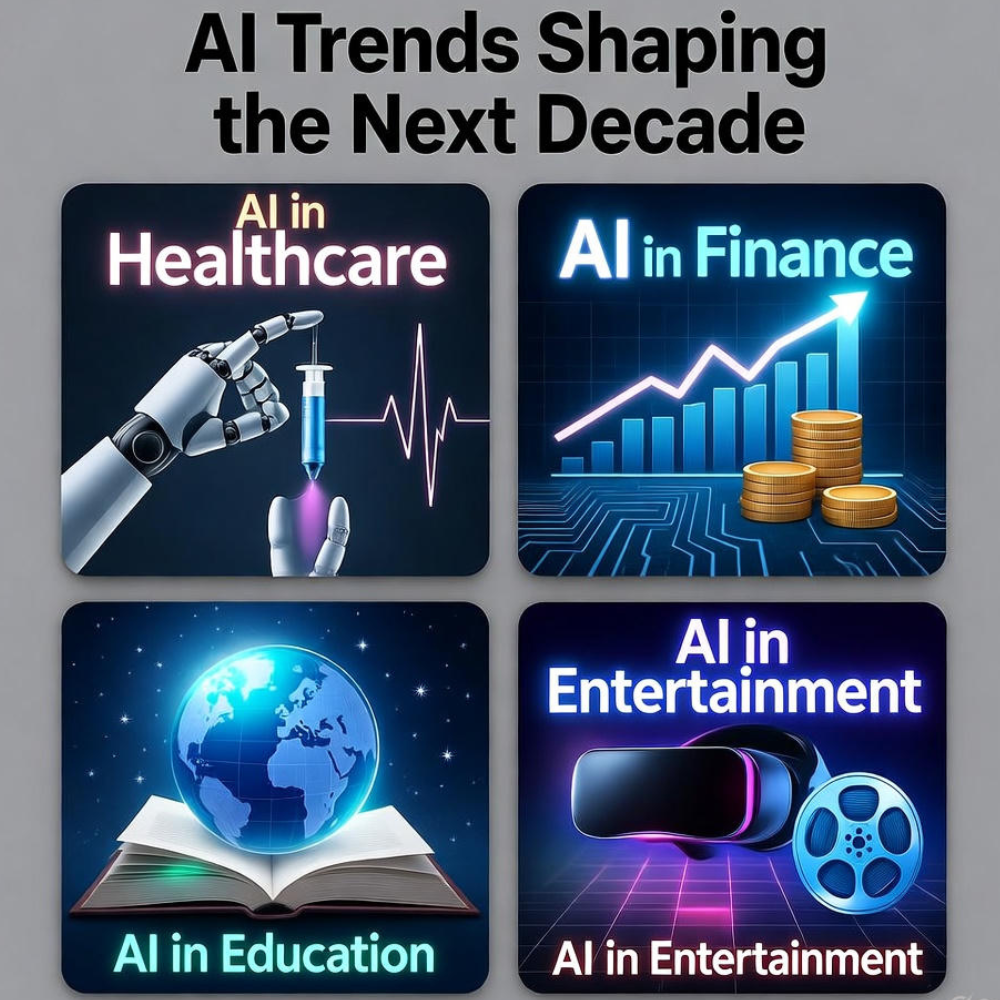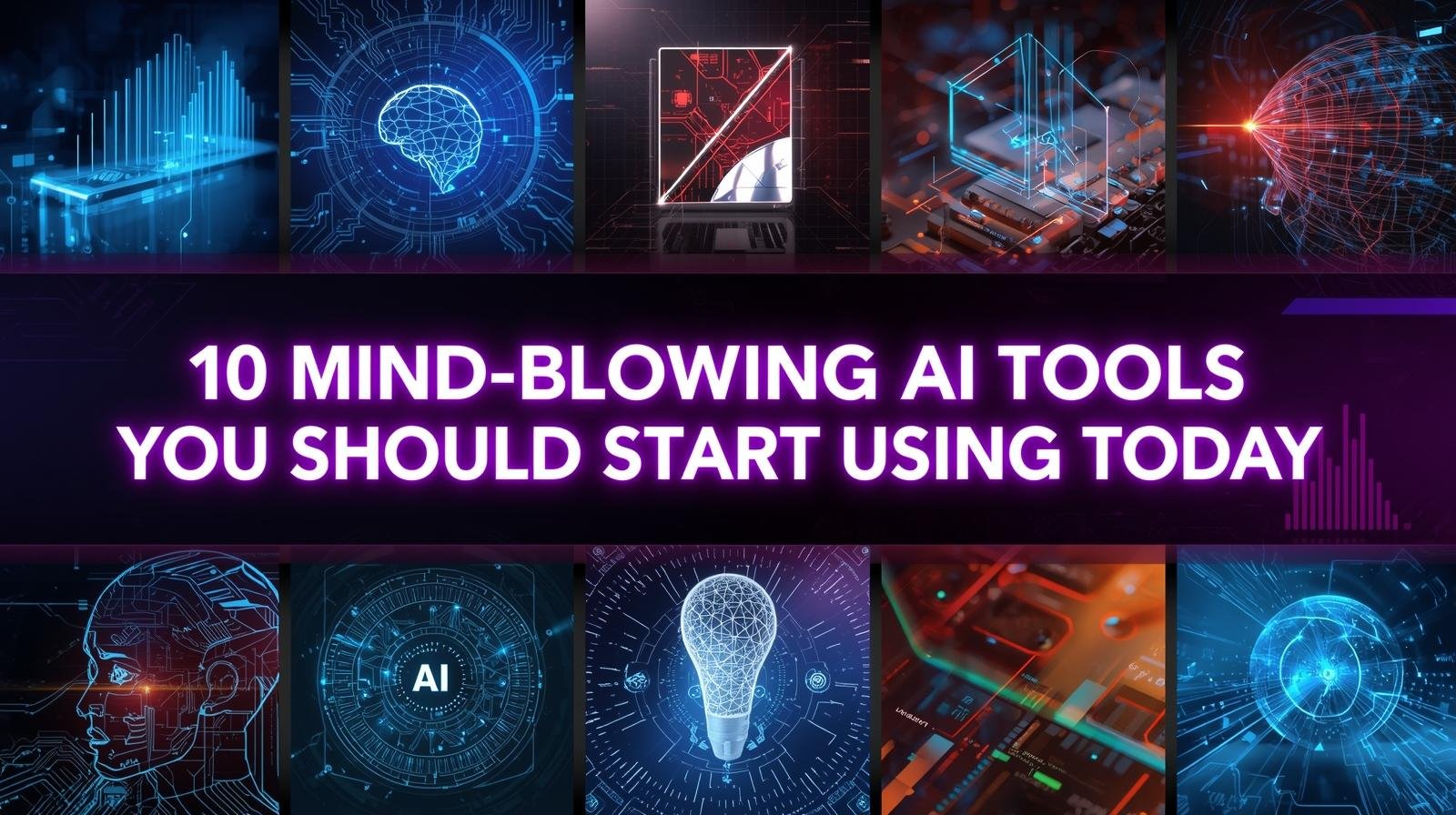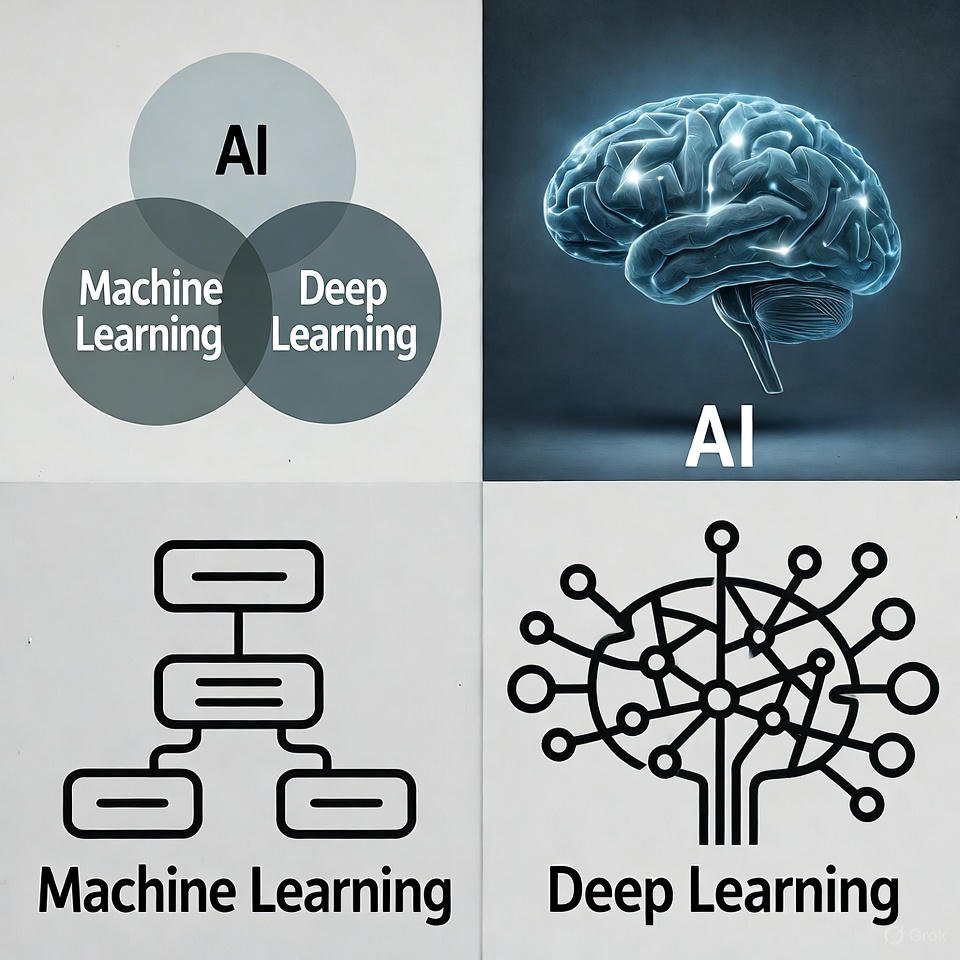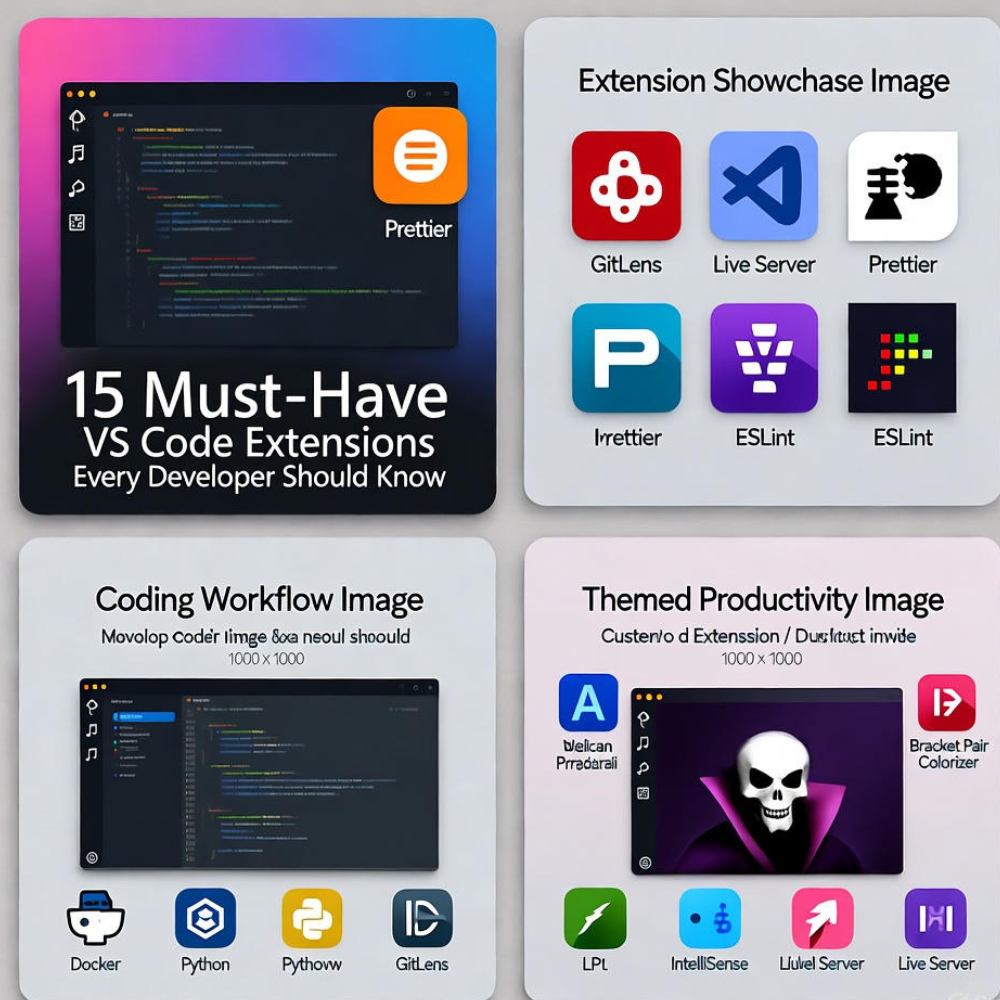Artificial Intelligence (AI) is no longer a futuristic concept — it’s a present reality shaping everything from healthcare to finance, marketing, and even how we replica Rolex watches live our daily lives. Over the past decade, AI moved from research labs into our smartphones, offices, and homes. But what comes next?
As we step into the next decade, AI is poised to redefine how societies function, how businesses innovate, and how humans interact with technology. The pace replica Breilting watches of AI evolution — fueled by advances in computing power, data availability, and deep learning models — is accelerating at an unprecedented rate.
This article explores the top AI trends that will shape the coming decade, from generative models and ethical AI to edge computing, autonomous systems, and more. Whether you’re a business leader, developer, or simply an enthusiast, understanding these trends can help you stay ahead in an AI-driven world.
1. The Rise of Generative AI
From Text to Everything
Generative AI has taken the world by storm. What started with tools like ChatGPT, DALL·E, and Midjourney has expanded into domains like video creation, music composition, and software coding. Over the next decade, generative AI will evolve from content creation to co-creation — helping humans design, imagine, and innovate faster than ever.
Applications to Watch
- Content Creation: AI tools will write articles, scripts, and marketing copy with near-human fluency.
- Design & Art: AI-powered design assistants will generate visuals, UI layouts, and animations.
- Software Development: Developers will Rolex replica watches increasingly rely on AI pair programmers like GitHub Copilot.
- Film & Entertainment: AI will help create entire movie scenes, characters, or special effects.
What It Means
Generative AI won’t just automate creative tasks; it will expand human creativity. Expect industries like gaming, architecture, and entertainment to rely heavily on AI-driven ideation.
2. AI Becomes Hyper-Personalized
Smarter, Context-Aware Systems
The next generation of AI will be more context-aware — understanding user preferences, moods, and needs. Personal assistants won’t just schedule your meetings; they’ll anticipate your goals, emotional states, and priorities.
Examples
- Healthcare: Personalized treatment plans using patient data and genetics.
- E-commerce: Product recommendations fine-tuned to micro-behaviors.
- Education: Custom learning paths that adapt to student progress and style.
- Marketing: Predictive AI models delivering hyper-targeted ads.
Impact
Personalized AI will redefine customer experience and engagement. But it also raises privacy concerns, making data ethics and consent crucial discussion points for the decade ahead.
3. Edge AI and On-Device Intelligence
Why It Matters
AI currently relies heavily on cloud computing. However, Edge AI — processing data locally on devices instead of remote servers — is gaining traction.
Benefits
- Speed: Reduced latency for real-time applications (like autonomous vehicles).
- Privacy: Sensitive data doesn’t leave the device.
- Efficiency: Less bandwidth usage and server dependency.
Applications
- Smartphones: Real-time translation, photo enhancement, and voice recognition.
- IoT Devices: Home automation systems making instant decisions locally.
- Industrial Automation: Sensors that analyze conditions instantly for predictive maintenance.
The next decade will see AI chips embedded in everything from cars to wearables, powering faster, safer, and more responsive systems.
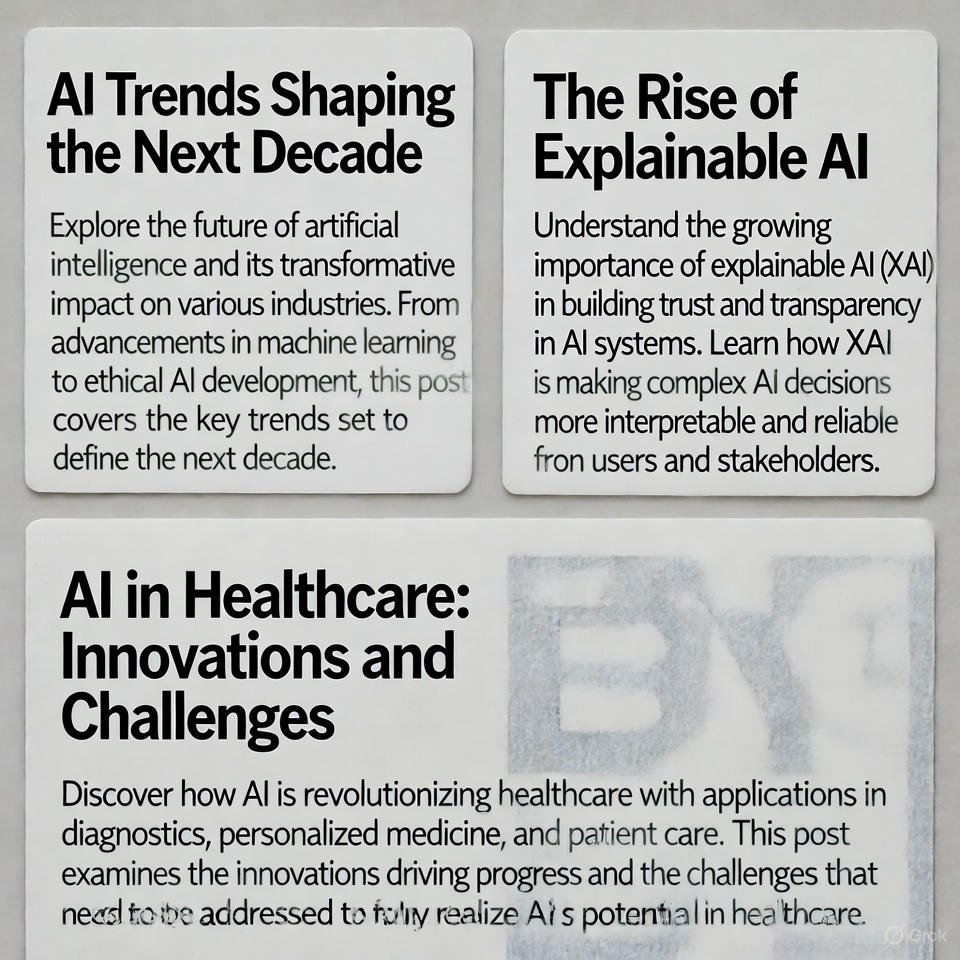
4. AI in Healthcare: Predictive, Preventive, and Personalized
AI’s impact on healthcare will be nothing short of revolutionary.
Trends to Watch
- Predictive Diagnostics: Algorithms that detect diseases earlier than human experts.
- Drug Discovery: AI models simulating molecular interactions to accelerate new drug development.
- Virtual Health Assistants: 24/7 medical chatbots providing initial triage and guidance.
- Precision Medicine: Custom treatments based on individual genetic makeup.
Example
In oncology, AI systems like DeepMind’s AlphaFold have decoded protein structures, helping scientists understand diseases faster.
By 2035, AI-enabled healthcare could save billions globally by improving early diagnosis and reducing medical errors.
5. The Ethical AI Revolution
Why Ethics Will Define the Next Decade
As AI becomes powerful, questions around fairness, bias, transparency, and accountability are becoming central. The AI of the future must not only be smart — it must be ethical.
Key Focus Areas
- Bias Reduction: Ensuring AI systems treat all demographics fairly.
- Explainability: Making AI decisions interpretable to humans.
- Regulation: Governments are developing frameworks like the EU AI Act to govern safe AI use.
- AI for Good: Using AI in sustainability, accessibility, and social welfare initiatives.
Takeaway
Ethical AI will be a competitive advantage, not a compliance burden. Companies that prioritize trust and transparency will thrive.
6. The Expansion of Autonomous Systems
Beyond Self-Driving Cars
Autonomous technology is expanding into drones, delivery robots, and even self-operating factories.
Examples
- Transportation: Autonomous trucks improving logistics efficiency.
- Agriculture: Drones analyzing crop health and automating irrigation.
- Warehousing: AI robots managing inventory with precision.
The Future
Expect a world where autonomous systems collaborate — cars talking to traffic lights, robots coordinating in factories — creating an ecosystem of machine-to-machine intelligence.
7. AI-Powered Cybersecurity
With the rise of AI, cyber threats have also evolved. Traditional security tools can’t keep up with sophisticated attacks. Enter AI-driven cybersecurity.
Capabilities
- Threat Detection: Identifying anomalies in real-time.
- Fraud Prevention: Detecting suspicious transactions and patterns.
- Adaptive Defense: Systems that learn and adapt to new attack vectors automatically.
Stat Insight
According to IBM, organizations using AI in cybersecurity reduce breach detection times by up to 74%.
The next decade will see AI defending AI — as intelligent systems combat AI-powered attacks.
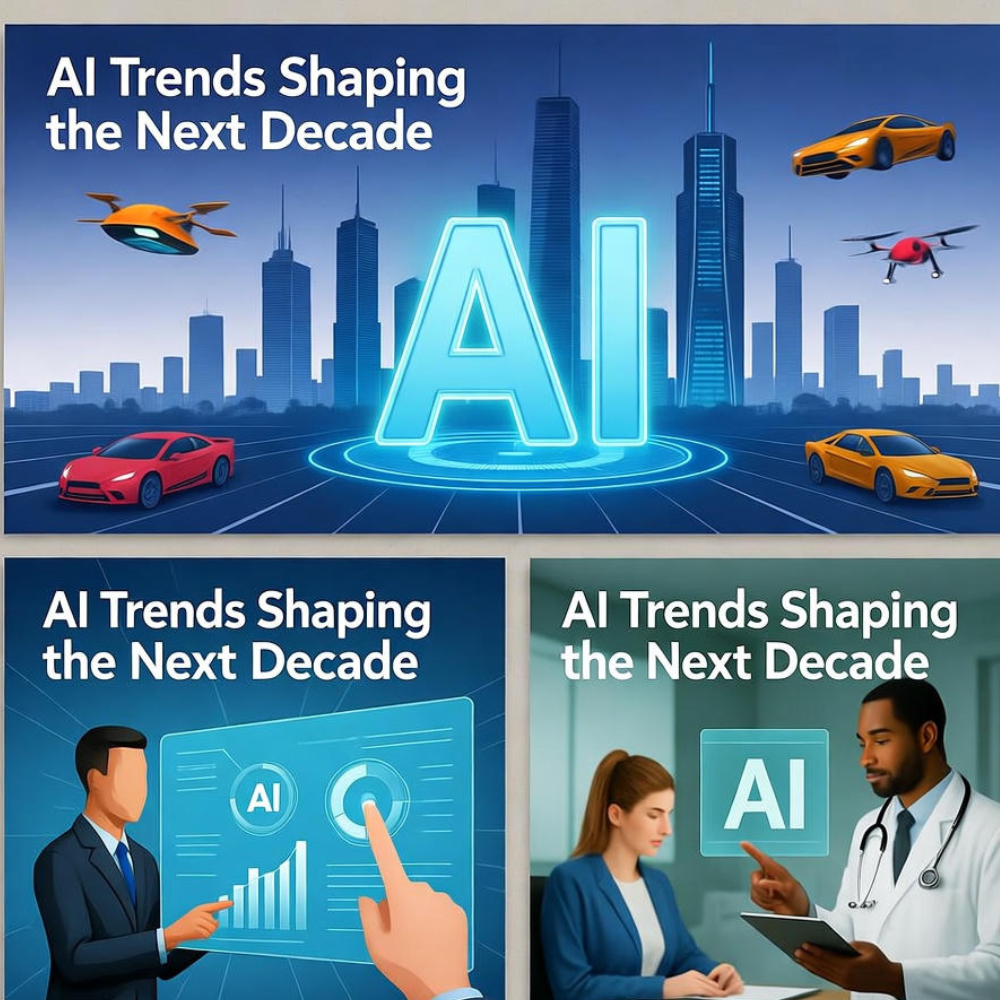
8. AI in Business and Decision-Making
Data-Driven Strategy
AI is becoming the brain behind major corporate decisions. From inventory optimization to pricing models, AI analytics tools enable executives to make informed, predictive choices.
Trends
- AI-Driven CRMs: Predict customer churn or purchase likelihood.
- Process Automation: Replace repetitive tasks with robotic process automation (RPA).
- AI in HR: Analyze candidate fit, reduce bias, and improve workforce planning.
Insight
By 2030, over 80% of business decisions will be AI-assisted, helping companies operate with speed, accuracy, and foresight.
9. The Democratization of AI
AI for Everyone
In the next decade, AI will no longer be limited to big tech companies. Thanks to open-source models, low-code AI platforms, and affordable computing, small businesses and individuals will harness AI easily.
Examples
- No-Code AI Tools: Build models using drag-and-drop interfaces.
- AI-as-a-Service: Subscribe to APIs for vision, text, and speech recognition.
- Community Models: Platforms like Hugging Face promoting open collaboration.
This democratization will lead to a surge in AI startups, innovation, and inclusivity — ensuring AI benefits everyone, not just a few.
10. Human-AI Collaboration: The Augmented Workforce
The Future of Work
AI isn’t replacing humans; it’s augmenting them. The next decade will focus on collaborative intelligence, where humans and AI combine strengths.
Examples
- Customer Support: AI bots handling routine queries while humans manage complex ones.
- Creative Industries: AI assisting in brainstorming and design.
- Engineering: AI suggesting design optimizations in real time.
Key Insight
According to PwC, AI could boost global GDP by $15.7 trillion by 2030, primarily through productivity gains from human-AI collaboration.
11. Quantum AI: The Next Frontier
Quantum Meets Intelligence
Quantum computing will supercharge AI capabilities by processing data in ways classical computers can’t.
Applications
- Drug Discovery: Simulating molecular structures at lightning speed.
- Optimization Problems: Solving complex logistics and financial models instantly.
- AI Model Training: Training massive neural networks in minutes, not days.
While still in its infancy, Quantum AI represents the next giant leap — potentially transforming industries reliant on computation-heavy processes.
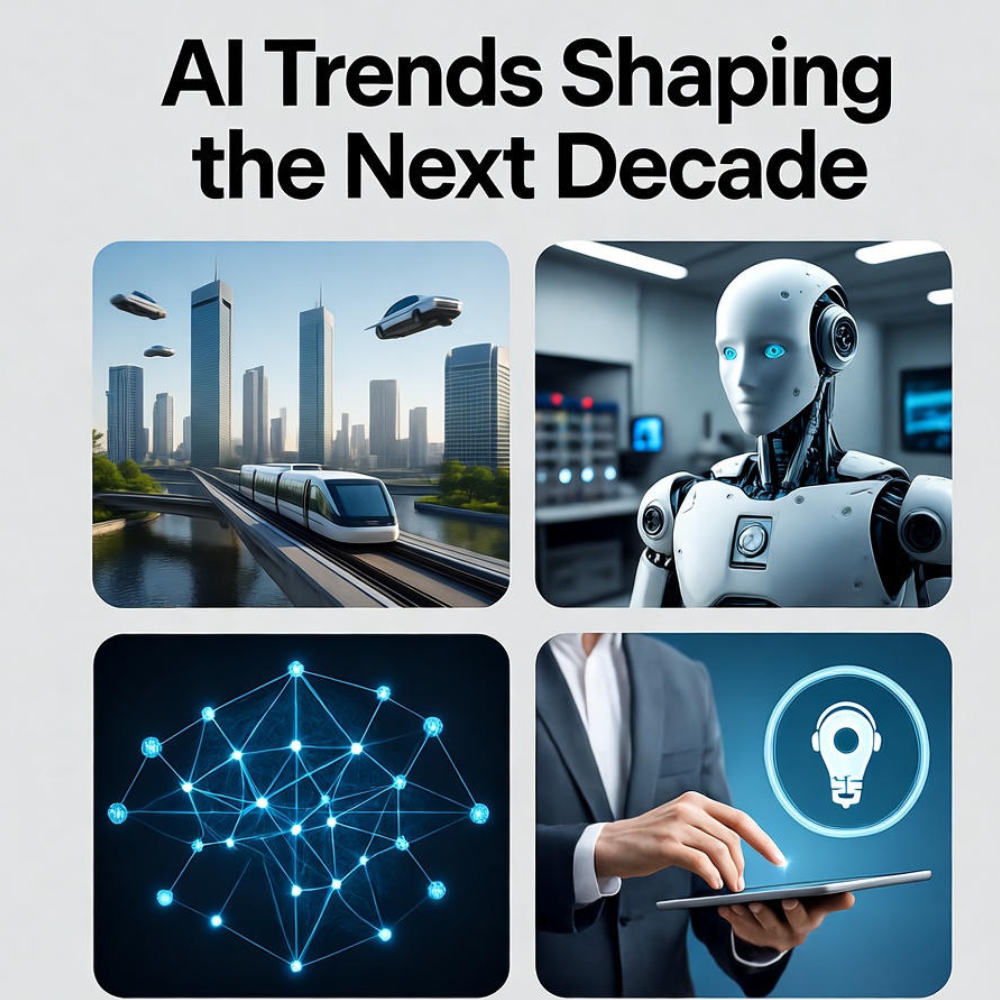
12. AI for Sustainability
Smarter Planet, Greener Future
AI will play a vital role in tackling climate change and resource management.
Examples
- Energy Optimization: Smart grids predicting energy demand.
- Agriculture: AI-driven systems optimizing irrigation and fertilizer use.
- Climate Modeling: Predicting environmental patterns for proactive response.
Outcome
AI for sustainability isn’t just about saving the planet — it’s about building efficient, resilient systems that support long-term human progress.
13. The Future of AI Regulation and Governance
Governments worldwide are realizing AI’s potential and risks. The next decade will see comprehensive global frameworks emerge.
Expected Developments
- Transparency Requirements: Companies must disclose how AI makes decisions.
- Certification Systems: Auditing AI for compliance and fairness.
- International Collaboration: Global treaties to ensure ethical AI deployment.
Why It Matters
As AI influences finance, justice, and employment, governance will be essential to ensure human rights and accountability remain central.
14. The Evolution of AI Interfaces
From Clicks to Conversations
Voice assistants, gesture control, and brain-computer interfaces (BCIs) will redefine how humans interact with AI.
Innovations
- Voice & Vision: AI understanding not just words, but emotions and context.
- AR/VR Integration: Immersive AI experiences in virtual worlds.
- Neural Interfaces: Devices allowing users to control machines directly with thoughts.
This human-centric evolution will make technology more intuitive, accessible, and emotionally intelligent.
Conclusion
The next decade of AI will be transformational, blending creativity, ethics, and intelligence in ways that redefine society. From generative models that enhance imagination to ethical frameworks that ensure fairness — AI will shape how we live, work, and think.
But one truth remains constant: the future of AI is deeply human.
As machines grow smarter, our role is to guide, question, and collaborate — ensuring that AI serves humanity’s best interests. Those who adapt, innovate, and lead with responsibility will shape not just the next decade, but the next era of civilization.

